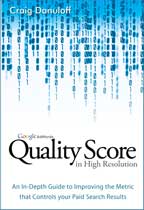I was wrong. A couple of times. The subject was ‘how quality score works’. And in both cases I wrote long detailed posts on this very blog, and I have come to learn that these particular posts were not accurate. My revised world view was provided courtesy of our friends at Google. They have been kind enough to help me to better understand quality score – the gory details and the dark recesses – over the past six months or so, and I’m going to share some of what I’ve learned.  Actually, I’m going to share all of what I’ve learned, but only some of it will be here on the blog. For the full story, you’ll have to get yourself a copy of my upcoming book ‘Quality Score in High Resolution‘ which will be out in June. If you’re a ClickEquations client, you’ll be getting a courtesy copy. Otherwise you can pre-order your own copy for a limited time at a 46% discount off the not-so-tiny retail price. Now on to my most recent mistake.
Actually, I’m going to share all of what I’ve learned, but only some of it will be here on the blog. For the full story, you’ll have to get yourself a copy of my upcoming book ‘Quality Score in High Resolution‘ which will be out in June. If you’re a ClickEquations client, you’ll be getting a courtesy copy. Otherwise you can pre-order your own copy for a limited time at a 46% discount off the not-so-tiny retail price. Now on to my most recent mistake.
The Actual Truth About Quality Score and Search Queries
A few months ago I wrote a post called ‘Match Types & Quality Score – The Truth At Last‘. It turns out the title probably should have been ‘Match Types & Quality Score – More Confusion and Inaccuracy’. I thought I had it right, but my source was reading between the lines in the detailed study of the official word and various conversations over the past few years.  Now this is embarrasing for many reasons. Chief among them is the fact that I’m not a fan of all the how freely incorrect information and poor advice flows through blogs and tweets and even from the conference podium in this market. I generally work hard to know my song well before I start singing, as some old man once said when he was younger than he’s now. But I blew it on this one (and at least one other which I’ll admit next Monday.) I am glad that I get to correct the error. I wrote this book to clear up the many mistaken assumptions and recommendations I regularly see passed off as quality score information and ‘tips’. The fact that the research process exposed some of my own errors is a fair price to pay to set the overall record straight. When I sat down with Google to ask for their help in research and tech-editing the book, I told them that I really didn’t want to do all this work and get it wrong. But I knew there were many specific points that I couldn’t be sure of, because the published material wasn’t detailed enough. I was very pleased and excited when they agreed to help. Over time they answered every question I asked, and only rarely with a ‘no comment’. This includes responding to the ’11 Hard Questions About Qualty Score‘ I posted a few months ago.
Now this is embarrasing for many reasons. Chief among them is the fact that I’m not a fan of all the how freely incorrect information and poor advice flows through blogs and tweets and even from the conference podium in this market. I generally work hard to know my song well before I start singing, as some old man once said when he was younger than he’s now. But I blew it on this one (and at least one other which I’ll admit next Monday.) I am glad that I get to correct the error. I wrote this book to clear up the many mistaken assumptions and recommendations I regularly see passed off as quality score information and ‘tips’. The fact that the research process exposed some of my own errors is a fair price to pay to set the overall record straight. When I sat down with Google to ask for their help in research and tech-editing the book, I told them that I really didn’t want to do all this work and get it wrong. But I knew there were many specific points that I couldn’t be sure of, because the published material wasn’t detailed enough. I was very pleased and excited when they agreed to help. Over time they answered every question I asked, and only rarely with a ‘no comment’. This includes responding to the ’11 Hard Questions About Qualty Score‘ I posted a few months ago.
The Details of My Mistake
The crux of the mistake I made concerning the role of search queries was taking the fact that google says ‘quality score is calculated based on keyword performance only when a keyword perfectly matches a search query’ too literally. One of the things I learned while writing the book and trying to follow all the threads presented in the AdWords help files and official information, is that whenever someone (including Google) says ‘quality score’ you’d better quickly ask ‘which one’ (the book lists eight of them). In this case I fell down the very easiest hole – the statement above refers to what I call ‘visible quality score’ the number we all see next to our keywords in the AdWords interface. Visible quality score differs from the versions of quality score used to calculate important things like ad rank and CPC in a number of ways. The statement above is entirely true in terms of visible quality score – the numbers you see are only impacted by queries that equal the keywords – but that does not mean, as I claimed in the earlier blog post, that the quality score from queries identical to a keywords is used to make decisions or calculations about queries that are not identical to the keyword.  To be fair and complete (and slightly mysterious) there is a second cause of my error. This one is based on what I think is an intentional misdirection Google uses when talking broadly about quality score. Google is expert at shaping our perceptions and expectations, and one of the ways they do this is by creating impressions that aren’t literaly true but serve some other purpose – sometimes even for our own good. Suffice it to say that when that blog post was written I still held some nieve (although almost universally held) beliefs and I am no longer so afflicted. The third element of my mistake, this is more of a proof or an error-of-oversight, is the fact that the core description of the calculation of qualty score includes ‘the relevance of the keyword and the matched ad to the search query’. So Google had in fact already definitively confirmed that search query was considered. I knew that but overlooked it’s implication when writing that post.
To be fair and complete (and slightly mysterious) there is a second cause of my error. This one is based on what I think is an intentional misdirection Google uses when talking broadly about quality score. Google is expert at shaping our perceptions and expectations, and one of the ways they do this is by creating impressions that aren’t literaly true but serve some other purpose – sometimes even for our own good. Suffice it to say that when that blog post was written I still held some nieve (although almost universally held) beliefs and I am no longer so afflicted. The third element of my mistake, this is more of a proof or an error-of-oversight, is the fact that the core description of the calculation of qualty score includes ‘the relevance of the keyword and the matched ad to the search query’. So Google had in fact already definitively confirmed that search query was considered. I knew that but overlooked it’s implication when writing that post.
How Search Queries Influence Quality Score
When quality score is being calculated, after a query has been made and before the advertisers and pricing has been decided, AdWords looks at a wide range of factors to assign your keyword a quality score. One of those factors is relationship between the current search query and the current keyword. That relationship can dramaticaly impact the resulting quality score, which means that different search queries matched to one keyword may see significantly different rankings and significantly different CPCs even if they achieve the same ranking. Search queries are a part of what determines quality score, just not the quality score you see in your account every day.
Doubling Down and Getting It Half Right
I compounded my error by going on to say that the solution to the problem of search queries not impacting quality score, was to create new keywords in order to give each query what amounted to ‘access’ to its own quality score.  The point I was making may have been wrong, but the idea still has merit. By adding a new keyword from what was once just a search query, you do gain the ability to see the quality score for that query – because now it will be identical to the keyword. Suppose you bid on the broad match keyword ‘dog food’ and it was frequently getting matched to the search queries ‘organic dog food’ and ‘cheap dog food’ among many others. Now further suppose that when AdWords looked at the ‘relationship between these queries and the keyword’ what they saw was, relative to the query ‘dog food’ itself, very positive for the query ‘organic dog food’ and fairly negative for the query ‘cheap dog food’. In that case, the quality score visible in the account would reflect the performance of the ‘dog food’ search queries. But the queries ‘organic dog food’ and ‘cheap dog food’ would get real-time qualty score calculations, and the resulting impression counts, positions, and costs, based on their own merits. But you would never be able to see those differences. If on the other hand, you added ‘organic dog food’ and ‘cheap dog food’ as their own keywords (probably in phrase or exact match, but that really doesn’t matter) then the visible quality scores that would appear for these keywords would (ultimately perhaps not immediately) reflect the full detail of their performance and value as AdWords saw it. By splitting them out you’d be able to make their ‘invisible’ quality scores visible.
The point I was making may have been wrong, but the idea still has merit. By adding a new keyword from what was once just a search query, you do gain the ability to see the quality score for that query – because now it will be identical to the keyword. Suppose you bid on the broad match keyword ‘dog food’ and it was frequently getting matched to the search queries ‘organic dog food’ and ‘cheap dog food’ among many others. Now further suppose that when AdWords looked at the ‘relationship between these queries and the keyword’ what they saw was, relative to the query ‘dog food’ itself, very positive for the query ‘organic dog food’ and fairly negative for the query ‘cheap dog food’. In that case, the quality score visible in the account would reflect the performance of the ‘dog food’ search queries. But the queries ‘organic dog food’ and ‘cheap dog food’ would get real-time qualty score calculations, and the resulting impression counts, positions, and costs, based on their own merits. But you would never be able to see those differences. If on the other hand, you added ‘organic dog food’ and ‘cheap dog food’ as their own keywords (probably in phrase or exact match, but that really doesn’t matter) then the visible quality scores that would appear for these keywords would (ultimately perhaps not immediately) reflect the full detail of their performance and value as AdWords saw it. By splitting them out you’d be able to make their ‘invisible’ quality scores visible.
A Lot of Shadows In A Short Hallway
I hope this post clarifies the facts about search queries and quality score. I regret and apologize for the original mistake.  This episode highlights a lot about the complexity of quality score – both in terms of how it works and how we as paid search managers get information about it. The complexity of both of thse is one of the main reasons I took up the task of figuring this stuff out and writing this book. This post has turned out long enough, so I’ll say more about that in the near future. In the meantime, if you’d like to support this project, please consider taking advantage of the pre-sale pricing and offers.
This episode highlights a lot about the complexity of quality score – both in terms of how it works and how we as paid search managers get information about it. The complexity of both of thse is one of the main reasons I took up the task of figuring this stuff out and writing this book. This post has turned out long enough, so I’ll say more about that in the near future. In the meantime, if you’d like to support this project, please consider taking advantage of the pre-sale pricing and offers.



